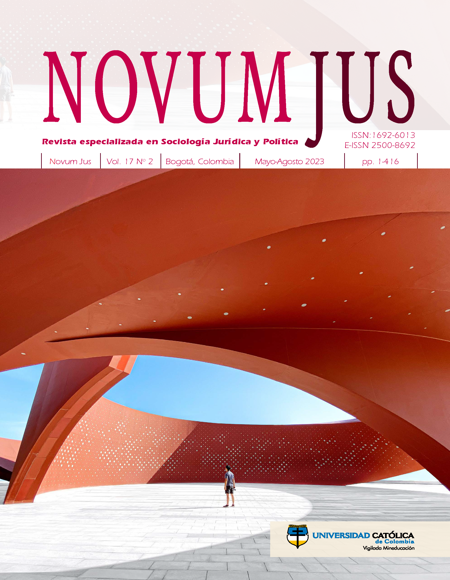
This work is licensed under a Creative Commons Attribution-NonCommercial 4.0 International License.
Authors who publish with this journal agree to the following terms:
- Authors retain copyright and grant the journal right of first publication with the work simultaneously licensed under a Creative Commons Attribution Non-Commercial License that allows others to share the work with an acknowledgement of the work's authorship and initial publication in this journal.
- Authors are able to enter into separate, additional contractual arrangements for the non-exclusive distribution of the journal's published version of the work (e.g., post it to an institutional repository or publish it in a book), with an acknowledgement of its initial publication in this journal.
- Authors are permitted and encouraged to post their work online (e.g., in institutional repositories or on their website) prior to and during the submission process, as it can lead to productive exchanges, as well as earlier and greater citation of published work (See The Effect of Open Access).
Abstract
This article studies the legal framework and jurisprudence of the International Criminal Court on transgenerational harm. It has been elaborated through a search, selection, and analysis of this organ's judicial decisions to approach how this form of harm has been addressed to the detriment of potential victims. So far, it seems that this concept is still under legal debate and should be clarified by the Court for its possible application in future cases, leaving open the possibility of recognizing this harm and the subsequent right to reparation for victims affected by crimes judged and sanctioned by the Court.

References
Asamblea de Estados parte del Estatuto de Roma de la Corte Penal Internacional. Reglas deprocedimiento y prueba. Nueva York, 3-10 de septiembre de 2002.
Corte Interamericana de Derechos Humanos. Caso Rocha Hernández y otros vs. El Salvador. Sentencia del 14 de octubre de 2014.
Corte Penal International, Sala de Cuestiones Preliminares I. Corrigendum to the “Decision on the Applications for Participation Filed in Connection with the Investigation in the Democratic Republic of the Congo by a/0004/06 to a/0009/06, a/0016/06 to a/0063/06, a/0071/06 to a/0080/06 and a/0105/06 to a/0110/06, a/0188/06, a/0128/06 to a/0162/06, a/0199/06, a/0203/06, a/0209/06, a/0214/06, a/0220/06 to a/0222/06, a/0224/06, a/0227/06 to a/0230/06, a/0234/06 to a/0236/06, a/0240/06, a/0225/06, a/0226/06, a/0231/06 to a/0233/06, a/0237/06 to a/0239/06 and a/0241/06 to a/0250/06” (ICC-01/04-423-CorrtENG), 31 de enero de 2008.
Corte Penal Internacional, Sala de Apelaciones. Sentencia relativa a las apelaciones del fiscal y la defensa contra la decisión de la Sala de Primera Instancia sobre la participación de las víctimas de 18 de enero de 2008 (ICC-01/04-01/06-1432-tSPA), 11 de julio de 2008.
Corte Penal Internacional, Sala de Apelaciones. Judgment on the Appeals of the Defence Against the Decisions Entitled “Decision on Victims' Applications for Participation a […]” of Pre-Trial Chamber II (ICC-02/04-179), 23 de febrero de 2009.
Corte Penal Internacional, Sala de Primera Instancia I. Decision Establishing the Principles and Procedures to be Applied to Reparations (ICC-01/04-01/06-2904), 7 de agosto de 2012.
Corte Penal Internacional, Sala de Apelaciones. Order for Reparations (ICC-01/04-01/06-3129-AnxA), 3 de marzo de 2015.
Corte Penal Internacional, Sala de Primera Instancia II. Order for Reparations Pursuant to Article 75 of the Statute (ICC-01/04-01/07-3728-tENG), 24 de marzo de 2017.
Corte Penal Internacional, Sala de Apelaciones. Judgment on the Appeals Against the Order of Trial Chamber II of 24 March 2017 Entitled “Order for Reparations Pursuant to Article 75 of the Statute” (ICC-01/04-01/07-3778-Red), 8 de marzo de 2018.
Corte Penal Internacional, Sala de Cuestiones Preliminares II. Decision on the Matter of the Transgenerational Harm Alleged by Some Applicants for Reparations Remanded by the Appeals Chamber in its Judgment of 8 March 2018 (ICC-01/04-01/07-3804-Red-tENG), 19 de julio de 2018.
Corte Penal Internacional, Sala de Primera Instancia VI. Reparations Order (ICC-01/04-02/06-2659), 8 de marzo de 2021.
Corte Penal Internacional, Sala de Apelaciones. Judgment on the Appeals Against the Decision of Trial Chamber VI of 8 March 2021 Entitled “Reparations Order” (ICC-01/04-02/06-2782), 12 de septiembre de 2022.
Corte Penal Internacional. Trust Fund for Victims’ Submission Pursuant to Trial Chamber II’s Decisions on the Implementation of the Appeals Chamber Judgment Against the Reparations Order (ICC-01/04-02/06-2819), 30 de enero de 2023.
Dozio, Elisabetta, Marion Feldman, Cécile Bizouerne, Elise Drain, Mathilde Laroche, Malika Mansouri, Marie Roso y Lisa Ouss. “The Transgenerational Transmission of Trauma: The Effects of Maternal PTSD in Mother-Infant Interactions”. Frontiers in Psychiatry 11 (noviembre 2020): 1-12. https://www.frontiersin.org/articles/10.3389/fpsyt.2020.480690/full (acceso septiembre 8, 2022).
Gacka, Patryk. “Remote Victimisation and the Proximate Cause. Transgenerational Harms Before the International Criminal Court”. International Criminal Law Review 22, núm. 3 (2022): 438-474. https://doi.org/10.1163/15718123-bja10126 (acceso septiembre 5, 2022).
Matthews, Stephen y David Phillips. “Minireview: Transgenerational Inheritance of the Stress Response: A New Frontier in Stress Research”. Endocrinology 151, núm. 1 (2010): 7-13. https://academic.oup.com/endo/article/151/1/7/2456018 (acceso septiembre 8, 2022).
Organización de las Naciones Unidas [ONU]. Estatuto de Roma de la Corte Penal Internacional. Roma, 17 de julio de 1998.
ONU. Informe del relator especial sobre la promoción de la verdad, la justicia, la reparación y las garantías de no repetición, Fabián Salvioli. Las medidas de justicia transicional y el abordaje del legado de las graves violaciones de derechos humanos y del derecho internacional humanitario cometidas en contextos coloniales (A/76/180). Nueva York, 19 de julio de 2021.
Yehuda, Rachel y Amy Lehrner. “Intergenerational Transmission of Trauma Effects: Putative Role of Epigenetic Mechanisms”. World Psychiatry 17, núm. 3 (2018): 243-257. https://www.ncbi.nlm.nih.gov/pmc/articles/PMC6127768/ (acceso septiembre 6, 2022).
Yehuda, Rachel, James Schmeidler, Ellen Labinsky, Amanda Bell, Adam Morris, Shelly Zemelman y Robert Grossman. “Ten-Year Follow-Up Study of PTSD Diagnosis Symptom Severity and Psychosocial Indices in Aging Holocaust Survivors”. Acta Psychiatrica Scandinavica 119, núm. 1 (2009): 25-34. https://www.ncbi.nlm.nih.gov/pmc/articles/PMC2670556/ (acceso septiembre 8, 2022).





















